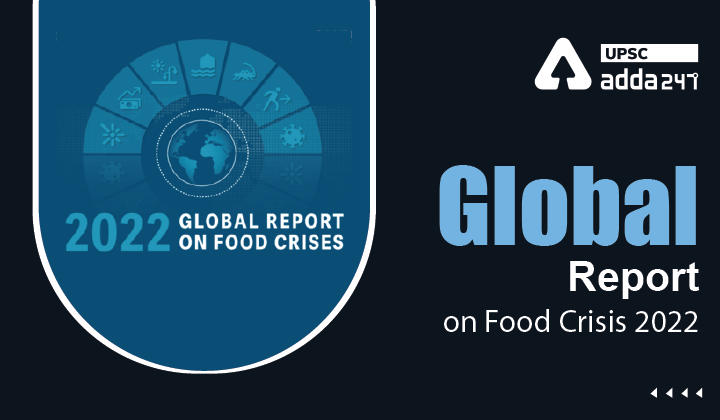Table of Contents
Global Report on Food Crisis 2022: Relevance
- GS 2: Issues relating to poverty and hunger.
Global Report on Food Crisis 2022: Context
- Recently, Global Network Against Food Crises (GNAFC) has released the Global Report on Food Crisis, where it has highlighted the acute food insecurity globally.
Global Report on Food Crisis 2022: Key findings
- The number of people facing acute food insecurity and requiring urgent life-saving food assistance and livelihood support continues to grow at an alarming rate.
- According to the report, around 193 million people in 53 countries or territories experienced acute food insecurity at crisis or worse levels in 2021.
- This represents an increase of nearly 40 million people compared with the already record numbers of 2020.
- Of these, over half a million people (570 000) in Ethiopia, southern Madagascar, South Sudan and Yemen were classified in the most severe phase of acute food insecurity Catastrophe.
- When looking at the same 39 countries or territories featured in all editions of the report, the number of people facing crisis or worse nearly doubled between 2016 and 2021, with unabated rises each year since 2018.
Global Report on Food Crisis 2022: Cause of food crises
- Conflict (main driver pushing 139 million people in 24 countries/territories into acute food insecurity, up from around 99 million in 23 countries/territories in in 2020);
- Weather extremes (over 23 million people in 8 countries/territories, up from 15.7 million in 15 countries/territories);
- Economic shocks – (over 30 million people in 21 countries/territories, down from over 40 million people in 17 countries/territories in 2020 mainly due to the fallout from the COVID-19 pandemic).
Global Report on Food Crisis 2022: Recommendations
- Action should be taken to move towards integrated approaches to prevention, anticipation, and better targeting to sustainably address the root causes of food crises.
- Need for a greater prioritization of smallholder agriculture as a frontline humanitarian response, to overcome access constraints and as a solution for reverting negative long-term trends.
- Promoting structural changes to the way external financing is distributed, so that humanitarian assistance can be reduced over time through longer-term development investments, can tackle the root causes of hunger.
- In parallel, we need to collectively promote more efficient and sustainable ways of providing humanitarian assistance.
- Strengthen a coordinated approach to ensure that humanitarian, development and peacekeeping activities are delivered in a holistic and coordinated manner.
- Ensure and avoid further fuelling conflict as an unintended consequence will also contribute to resilience building and recovery.
About Global Network Against Food Crises
- GNAFC is founded by the European Union, FAO and WFP in 2016, as an alliance of humanitarian and development actors working together to prevent, prepare for and respond to food crises and support the Sustainable Development Goal to End Hunger (SDG 2).
Read current affairs for UPSC





 TSPSC Group 1 Question Paper 2024, Downl...
TSPSC Group 1 Question Paper 2024, Downl...
 TSPSC Group 1 Answer key 2024 Out, Downl...
TSPSC Group 1 Answer key 2024 Out, Downl...
 UPSC Prelims 2024 Question Paper, Downlo...
UPSC Prelims 2024 Question Paper, Downlo...
